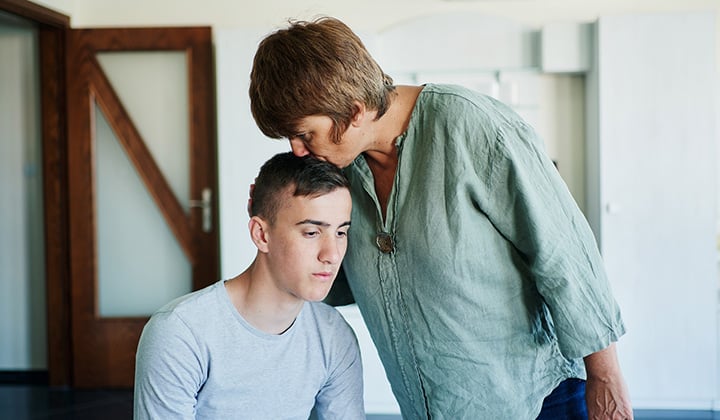Ways to support LGBTQ children experiencing discrimination

Wanting your child to feel included, loved and supported is one of the top hopes for any parent. When children are discriminated against, it can leave both the family and the child feeling targeted and worried. Here are some ways to help a child feel supported if they are facing discrimination.
Groups at risk of discrimination
Anyone who is different can be the target of discrimination. Recently, the LGBTQ community has again become the target of prejudice and inequity. Here’s a quick guide to a few terms and meanings as defined by GLAAD.
- LGBTQ - Acronym for lesbian, gay, bisexual, transgender and queer. The Q generally stands for queer when LGBTQ organizations, leaders and media use the acronym.
- Sexual orientation - The scientifically accurate term for a person’s enduring physical, romantic and/or emotional attraction to another person. Sexual orientations can include heterosexual (straight), lesbian, gay, bisexual, queer, asexual and other orientations.
- Gender identity - A person's internal, deeply held knowledge of their own gender. Everyone has a gender identity. For many people their gender identity matches the sex they were assigned at birth.
- Transgender - An adjective to describe people whose gender identity differs from the sex they were assigned at birth. People who are transgender may also use other terms, in addition to transgender, to describe their gender more specifically.
How discrimination can impact mental health
Any person in a stigmatized group can feel a sense of rejection, feel isolated and be at an increased risk for harassment and bullying. This can also lead to negative mental and physical health. The Trevor Project reports 42% of LGBTQ youth had seriously considered attempting suicide in the past year. It was also reported that 75% of LGBTQ youth experienced some type of discrimination at least once in their lifetime because of their sexual orientation or gender identity.
As staggering as that statistic may be, it can be helpful to know there is a bright spot. Children who are not alone; those who have support from their caregivers and access to medical care are far more likely to grow into healthy, coping adults.
How to practice support
Research has shown the most important factor proven to help children in stigmatized groups be protected against bad health outcomes is family support. A supportive family helps a child feel loved and safe. It only takes one accepting adult to help an LGBTQ child cope with harassment, anticipate problem situations and access supportive resources in schools and in the community. It doesn’t mean every caregiver understands or agrees with a child’s life 100%, but it does mean that a child knows they will be loved no matter what and they have someone who looks out for them. Here are a few ways to show support to your child.
- Practice respect and nonjudgement. No one likes to feel judged or misunderstood. It can feel frustrating and lonely. As a caregiver, you can help your child feel comfortable and safe by using their name and/or pronoun and listening/learning without judgment. Some phrases to try: This is new for me, but I’m going to try my best. and I want to show you respect, but please be patient with me as I learn your name and/or pronouns.
- Keep communication open. Being a safe space for your child to talk is so important as they learn and discover who they are. Listening and allowing them time to process will let them know they can always come to you for guidance and support. Another piece is trust – trust what your child is feeling or experiencing because it’s real for them. Some phrases to try: I am always here to listen to you and to try to learn from you. and How can I help?
- Focus on the immediate circle. There may be laws or rules being considered in schools and government that aim to limit your child’s rights and life. While it’s important to be aware of what’s going on that will impact your child’s life, it’s more important to focus on your child and their immediate support group. Try to not focus on all the things you can’t control and instead focus on what you can. Ensure they feel supported by you, have a strong friend group and have access to a health care provider they trust. Some phrases to try: Tell me about your friends. and Your doctor’s visit is coming up, what would you like to discuss at this visit?
- Be on their team. Families may go through a process of understanding. It might take some time for all members to understand what’s going on, even the child themselves. Wherever they are in their journey of understanding themselves, try to meet them where they’re at and learn together. Being on their team can also mean helping to advocate for them at school and with their teachers. Some phrases to try: We’re in this together. and We’ll figure this out together.
Resources for more support
There are many helpful online resources and support groups available for caregivers and families.
- GenderSpectrum.org – Resources for gender inclusion.
- The Trevor Project – Youth mental health supports. Suicide hotline LGBTQ youth – The Trevor Project; call 1 (866) 488-7386or text START to 678678.
- Amaze.org - Brief videos explaining sexual orientation, gender identity and other topics.
- Society of Adolescent Health and Medicine – Resources for teens and parents about a wide variety of topics including sexual orientation.
- Children’s Mercy Adolescent Specialty Clinic – LGBTQ friendly health care.
- Kansas City Center for Inclusion - LGBTQIA community center
- Red Card – Bullying prevention resources.
Related articles:


